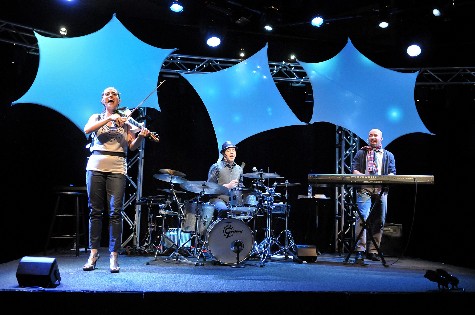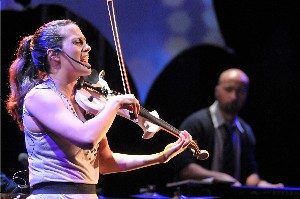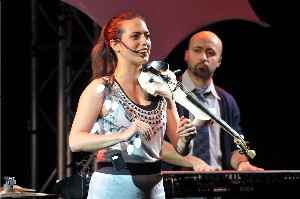Theater Review: Musical Matchgirl Multitasking
As a holiday concert experience, however, the show, ably performed by the SpeakEasy cast, amuses and induces toe-tapping. For those grumpy about sentimental Xmas entertainment, “Striking 12” delivers cheer, uplift, and plenty of musical talent while remaining blissfully devoid of the usual saccharine, holiday-show sentimentality.
Striking 12. Book and Lyrics by Brendan Milburn, Rachel Sheinkin, and Valerie Vigoda. Music by Brendan Milburn and Valerie Vigoda. Directed by Scott Sinclair. Music Direction by José Delgado. Presented by SpeakEasy Stage Company at Boston Center for the Arts, Boston, MA, through January 2.
By Alyssa Machado
“But in the corner, at the cold hour of dawn, sat the poor girl, with rosy cheeks and with a smiling mouth, leaning against the wall—frozen to death on the last evening of the old year. Stiff and stark sat the child there with her matches, of which one bundle had been burnt. [. . .] No one had the slightest suspicion of what beautiful things she had seen; no one even dreamed of the splendor in which, with her grandmother she had entered on the joys of a new year.”
— Hans Christian Andersen, “The Little Match Girl”
Striking 12, a secular holiday show created by rock trio GrooveLily, ventures into unusually ambitious territory for a musical holiday production. The creators attempted to fashion a “unique hybrid of musical theatre and live concert” inspired by and incorporating Hans Christian Andersen’s bleak New Year’s Eve tale “The Little Match Girl.”
Striking 12 proffers three plot levels. Throughout the show, the actors, as themselves, chat with the audience about the performance. In the main plotline, they assume characters to present the contemporary story of a grumpy guy who wants to be alone on New Year’s Eve and ends up reading “The Little Match Girl.” As he reads the classic tale, a third level emerges: a musical reenactment of the match girl’s story.
To complicate matters further, the three cast members also act as the band, performing on violin (Erikka Walsh), drum set (Zachary Hardy), and keyboard (José Delgado) while singing and acting multiple parts. SpeakEasy Stage Company appropriately placed the show, which has minimal set and costuming, in the intimate, cabaret-style venue of Deane Rehearsal Hall at the Boston Center for the Arts.
With so much to juggle, it is not surprising that the show drops a ball or two. The story’s multi-layered structure causes jarring transitions: the main plot and the Match Girl story constantly interrupt each other and the actors interrupt both on occasion to comment on their own performances. This prevents a cohesive narrative from forming and building emotional momentum.
In one particularly frustrating moment, the drummer interrupts a pivotal scene in the story of the match girl (she sees her beloved, dead Grandmother in a match flame) to sing “Give the Drummer Some,” a song complaining about his tendency to get smaller character parts. The comedic song’s unfortunate placement destroys a lovely, somber, and dramatic moment while it also dissipates the tension leading to the tale’s conclusion.
Striking 12 doesn’t really meld live concert and musical theater into a “unique hybrid” genre either. Instead, it jumps back and forth between genres much as it hops among plotlines. The actors chattering to the audience belongs to the concert genre: it is reminiscent of band members chatting between songs at a small-venue concert. The other two narrative elements in the show fall into the musical theater category.
The main storyline, about the New Year’s Eve plans of the unnamed protagonist (called Grumpy Guy in this review) lacks character detail, plot development, and high stakes. Grumpy Guy’s nebulous past and cynical, mopey personality make it difficult to sympathize with him. Grumpy Guy refuses encouragement to go out and sends away a quirky holiday-light saleswoman who comes to him. The holiday hermit chooses to read “The Little Match” girl instead, and that makes him budge.
It takes the entire show to develop this shallow skit, and there’s not all that much suspense: Will Grumpy Guy leave his apartment for New Year’s Eve? Will he learn anything from reading “The Little Match Girl”? Will he see the saleswoman again? For anyone familiar with holiday entertainment the outcome is not in doubt. Compared to Scrooge, Grumpy Guy is small potatoes.

José Delgado, Zachary Hardy, and Erikka Walsh play up a storm in STRIKING 12. Photo: Craig Bailey/Perspective Photo
The witty songs provide some amusing observations about the pitfalls of the holiday season, such as awkward parties, but rarely help develop the characters or add complexity to the plotlines . Without that development, musical theater is just music, or in this case, essentially a concert.
On the other hand, the retelling of “The Little Match Girl” using much of Andersen’s original text, results in wonderful musical theater, full of high stakes (will she find her Christmas vision or starve or freeze to death?), poetic narration, and emotional-packed songs that illuminate the Match Girl’s dreams and character.
Even the small projection screens hanging above the stage, which mostly provide mood lighting and ambiance (like falling snow) during the show, are at their theatrical best in the Match Girl story. Seághan McKay, the Scenic and Projection Designer, transforms old-fashioned, etching-style drawings into moving images of the Match Girl’s Christmas visions, images that blossom across the screens when she lights each match. Pictures of a glowing Christmas tree and a flickering fireplace enhance, as well as illustrate, the narration. Yet they remain subtle enough to keep the focus on Walsh’s performance as the Match Girl.
The plot may be underwhelming, but the three cast members consistently impress. They energetically perform instrumental music from memory in a wide variety of styles while acting and singing multiple character parts, and they make it all appear effortless. The music, catchy and agreeable, ranges from jazz and rock to Broadway and a bit of rap. The lyrics flow well and hit some emotional notes while generating plenty of humor.
Degaldo stands out as the strongest singer, both in quality of tone and in his ability to act with his voice in true musical theater fashion. Hardy and Walsh both have pleasant voices that are adequate for the material, though Walsh has a few off-key moments.
As the Match Girl, Walsh captures the poor girl’s wonder and innocence when she sees visions of a Christmas feast in the flickering match flames, but she doesn’t fully convey the bleak desperation and despair of her situation, literally freezing to death, ignored by everyone. In fact, Walsh suggests the girl’s plaintive despair and bittersweet redemption much more effectively with her violin in her haunting solo “Violin Ascension.”
Watching Striking 12 is like sitting down to a multi-course holiday meal and being asked to eat all of the courses at the same time. Although each course is tasty on its own, the flavors don’t always quite mesh or form cohesive meal when eaten together. In Striking 12’s case, the live concert and the musical theater flavors don’t always complement each other, and its three plotlines, like the courses at the omni-meal, are jumbled.
Overall, the effect is more “concert-with-a-story,” as the show’s creators describe it, than a work of narrative musical theater. As a holiday concert experience, however, the show, ably performed by the SpeakEasy cast, amuses and induces toe-tapping. For those who view the holiday season with a perspective closer to Grumpy Guy’s, Striking 12 delivers cheer, uplift, and plenty of musical talent while remaining blissfully devoid of the usual saccharine, holiday-show sentimentality.



